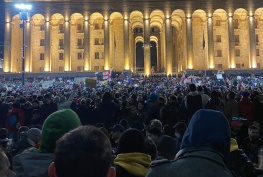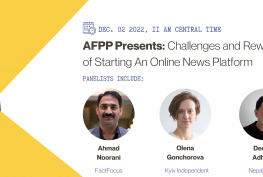Eyes on Economy, Ex-PM Becomes Front-Runner
By Saeed Shah, Khalid Khattak in Washington contributed to this article.
LAHORE, Pakistan—Former Prime Minister Nawaz Sharif, whose political party has governed Pakistan’s most-populous province for the past five years, has become the leading contender to run the whole country again as he campaigns on promises of economic salvation.
A conservative politician who traditionally wins much of the religious vote in Pakistan, Mr. Sharif brought the country into the nuclear club in 1998 and repeatedly clashed with the army, which ousted him a year later.
Should he return to power in May 11 elections, as polls have suggest he will, he would oversee one of the world’s most populous nations at a critical time. Pakistan’s democratic institutions are struggling to take root after decades of army interference. Taliban-led violence infects large parts of the country. The U.S. is withdrawing its massive military presence from next-door Afghanistan.
Mr. Sharif is positioning himself as a pragmatist who would steer Pakistan out of its economic tailspin with big infrastructure projects, including a bullet train he envisions running across the country. He has meanwhile stayed largely silent on other critical issues, such as extremist violence or the role of the military.
“We are a nuclear country but one without electricity, without gas, or water, or bread for people to eat,” Mr. Sharif said at a recent election rally in the town of Havelian, in northern Pakistan. “This is not the fate for Pakistan that I saw in my dreams. So I’ve decided, with all heart, to get the country out of this mess.”
Mr. Sharif is expected by many analysts and diplomats to stand up more defiantly to the country’s powerful military than did former President Asif Ali Zardari, who was thrust to the head of the Pakistan People’s Party after the assassination of his wife, Benazir Bhutto. Under the PPP government, Pakistan’s military establishment kept a tight grip on matters of foreign policy and national security.
By contrast, Mr. Sharif—who spent 14 months in detention and seven years in exile—won’t be such a pushover for the army because of his nationalist credentials, his experience dealing with the military and a political stature he has built over decades, say diplomats and analysts.
“He will ensure civilian supremacy after the trials he’s been through,” said Kamran Shafi, a columnist for the Express Tribune newspaper.
Western officials say they are generally comfortable with the rise of Mr. Sharif, who maintained close ties with President Bill Clinton during his tenure. Whether the Obama administration can follow suit depends in part on conditions in Pakistan.
“The United States has a history of working with Nawaz Sharif, and the key issue would be whether he is able to govern effectively, address economic issues and curb extremism,” said Vali R. Nasr, who served as senior adviser to the U.S. special representative for Afghanistan and Pakistan, Ambassador Richard Holbrooke, from 2009 to 2011.
Mr. Sharif regularly reminds voters that he had brought an improvement in Pakistan’s relations with arch-enemy India. One senior diplomat said that while Mr. Sharif is a tougher negotiator, he could have the power to implement whatever he agrees to, unlike what this person characterized as a largely powerless Mr. Zardari.
Over the years, Mr. Sharif, 63, has followed the developments in Turkey—another country with a long history of military interference in civilian politics—where the Islamist AKP party of Prime Minister Recep Tayyip Erdogan has defanged the military’s power in part through economic growth.
“Nawaz Sharif is obsessed by the Turkish model and thinks you can only take on the military if you deliver on the economic front,” said Lahore-based analyst Mehmal Sarfraz, who works at the South Asia Free Media Association, an independent regional organization.
On this front, Mr. Sharif’s party—the Pakistan Muslim League-Nawaz, or PML-N—says it has shown it can deliver. In the previous elections in 2008, PML-N once again won control over the government of Punjab, the richest of the country’s four provinces, with Mr. Sharif’s younger brother, Shahbaz Sharif, serving as chief minister.
The PML-N administration set itself apart from other provincial governments with initiatives that critics called populist gimmicks but that gained public attention. The Punjab administration has given laptops to thousands of students, provided subsidized bread and built several lavish schools for poor children, as well as a $300 million mass-transit bus service in the provincial capital, Lahore, that runs on an elevated track.
PML-N hasn’t been immune from the widespread anti-Americanism that pervades Pakistan. In 2011, its Punjab government announced that it would no longer take direct American aid. “We have been reduced to the level of a client state and insulted and humiliated,” Shahbaz Sharif said at the time.
The policy cost the province about $100 million in projects to upgrade hospitals and schools, as well as train Punjabi police, according to Pakistani and Western officials.
Mr. Sharif’s party, however, hasn’t said it will reject American aid to the federal government. U.S. civilian assistance is supposed to provide around $1 billion a year to Pakistan. In practice, the sum is closer to $500 million.
Should he win national office again, Mr. Sharif—whose government succeeded in building a highway between Lahore and Islamabad in the 1990s—has promised a bullet train that will move passengers from Karachi on the country’s south coast to Peshawar in the northwest.
“There is no ideological content to his speeches,” said Nusrat Javed, a liberal commentator who hosts of one of Pakistan’s leading political talk shows, on the Aaj News channel. “They are all about resolving economic problems, bringing new infrastructure projects. His focus is basically the economy, and that’s good news.”
A poll in February by Gallup Pakistan predicted that PML-N will win 41% of the vote, followed the Pakistan Peoples Party, with 17%. Another contender, a party led by former cricket star Imran Khan, was forecast to poll 14%.
Should such predictions roughly hold true, PML-N would likely need to seek the support of coalition partners to form a government.
Mr. Sharif, portly and famously fond of food, cultivates the image of being a typical Punjabi. In Lahore, Mr. Sharif’s hometown, shopkeeper Shahid Butt, explained why he would vote for the former prime minister. “He is one of us. He’s done lots of work, built lots of things and no one can deny that,” said Mr. Butt, 41 years old. “Why should we ditch that for new people?”
While the Pakistani Taliban has claimed responsibility for attacks on the secular-oriented PPP, Awami National Party and the Muttahida Qaumi Movement parties that belonged to the outgoing federal government during the campaign, these militants haven’t disrupted the campaigning by Mr. Sharif’s party. Mr. Sharif has avoided explicit criticism of the Taliban, calling instead for negotiations with the militants.
“Our first priority is always to generate more economic activity. The other problems, like peace in the region, law and order, cannot be tackled without putting Pakistan on the fast track of development,” said Pervaiz Rashid, a close aide to Mr. Sharif and a senator for the party.
Those who know Mr. Sharif well say that while he is devout, he follows the gentle Barelvi form of Islam that is traditional in Pakistan, not the hardline Wahhabi ideology spread by Saudi Arabia, where he spent part of his years in exile.
“He’s no closet Taliban,” said Ayaz Amir, a newspaper columnist and former PML-N lawmaker.




